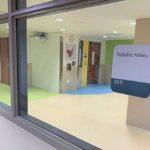Reducing wait times and improving the patient experience for Western Pennsylvanians in need of mental health care drove UPMC Western Psychiatric Hospital to develop a soon-to-open $15 million diagnostic and intake wing, the hospital’s newly installed president said Tuesday night.
“There sometimes have been longer wait times, and that’s part of the reason that inspired this investment in having additional service capabilities and expansion … and the expansion of staffing associated with it,” said Deborah Brodine, a 26-year UPMC employee whose first day as Western Psych’s president was May 1.
Brodine could not immediately provide information about current wait times or how the project could reduce them. She said most patients get seen in a couple hours or less, though wait times can be longer on especially busy days.
Brodine said following an open house to unveil the Oakland hospital’s $15 million Diagnostic Evaluation Center, called the DEC. The addition relocates what serves as Western Psych’s emergency room from the hospital’s first to fifth floor.
Vibrant colors, art-covered walls, features for playing soothing music and a fish-filled aquarium are among special touches in the expanded space.
“It’s really intended to be a living environment so that people have the opportunity to calm down and be part of a conversation,” Brodine said.
The new wing includes a brightly lit enclosed space in the center adorned with colorful modern art called the “Pediatric Millieu,” designed to give children and teens getting treatment a more “kid-friendly” area to be away from adults — something that young patients had been requesting, Brodine said.
A second phase will include adding a floor with access to the new DEC directly from the adjacent parking garage. Patients and visitors currently have to walk out of the garage to the hospital’s entrance at De Soto and O’Hara streets.
Western Psych is the first stop for many patients seeking immediate mental health care across several counties, and the only 24/7 provider of acute psychiatric care with inpatient beds in the region. It’s open to anyone regardless of whether they have an in-network insurance card or no insurance.
Western Psych typically sees about 13,000 to 14,000 patients annually.
The hospital has nearly 253 licensed beds, with some closed temporarily amid renovations. At least 230 of them are full on an average day, Brodine said.
Nearly two-thirds of patients who go to Western Psych get discharged immediately back into the community after being evaluated and referred to outpatient care, Brodine said. About 35% get admitted into Western Psych or one of dozens of behavioral health facilities in the area.
Fulfilling the region’s unmet mental health needs won’t be achieved merely by renovating and adding beds, Brodine said, but rather by expanding the reach of mental health programs into dozens of local communities. Increasing the number of telemedicine psychiatric consultations is one such effort by Western Psych, as is partnering with behavioral health centers across and outside the city of Pittsburgh.
“We don’t have a lot of excess space in this facility in order to go forward and create a lot of additional acute care beds,” she said. “Our goal is to make sure that there is a care continuum and to make sure that people have access to the level of care that they need.”
Brodine pointed out her professional background primarily has been in community-based services as opposed to hospitals.
“There’s a need for us to provide more behavioral health services in the community, so I was very excited about the opportunity to expand into this area,” she said.
Squashing stigmas that hinder people from seeking mental health treatment is another top priority for Brodine.
She cited federal research showing that 1 in 5 adults have some sort of mental illness and more than half of those with mental illness will have some sort of episode that requires treatment, whether it is related to anxiety, depression, trauma or “something more significant.”
The new DEC is awaiting final approvals from the state Department of Health to open to patients. Brodine hopes those approvals will come by the end of the year or sooner. The second phase of renovation will be completed by the end of 2020.













